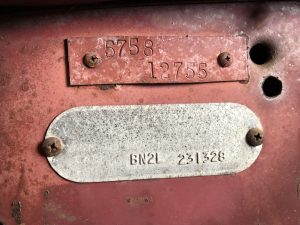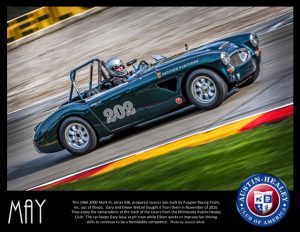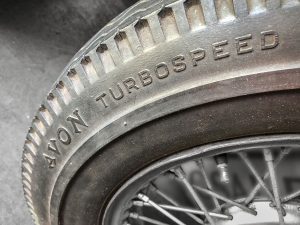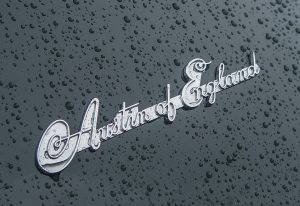-
Recent Posts
Recent Comments
2020 NORTHWEST MEET CANCELLED
Today we got word from the Austin-Healey Owners Association of British Columbia – hosts of this year’s “Northwest Meet” – that they would be unable to present the event due to provincial government orders. This is, of course, not surprising, but it is still disappointing.
Meantime, here’s the photo from the May page of the Austin-Healey Calendar:
Bear in mind that driving Healeys is not prohibited, as long as you don’t look like you’re enjoying it too much. That’s what will get you in trouble … that grin. I think I read a gubernatorial executive order prohibiting such activity if it looks non-essential. So try to look serious. It’s a dirty job – and essential! – but somebody’s gotta do it.
Posted in Uncategorized
Leave a comment
LOW HIGH MOWOG
Here’s a pic of one of the most seldom (is that proper English? “most seldom”?) seen parts of a Healey, the gearbox dipstick.
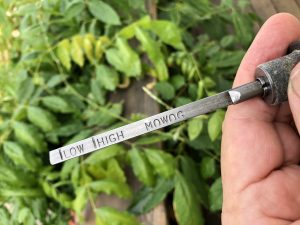
It’s pretty self-explanatory, but accessing it requires peeling back the carpet on the gearbox tunnel cover and removing a rubber plug in the tunnel cover, and consequently the gearbox oil level tends to be checked about once per ownership. Certainly it doesn’t need to be checked as often as engine oil, but if you’re feeling industrious and oh-so-responsible and conscientious, you might want to put it on your list of pre-touring-season checks this year. Or next.
For the uninitiated, the meaning of “MOWOG” is subject to some controversy. The two most-convincing theories say that it is an acronym for MOrris WOlseley Group or MOrris WOlseley mG, but if you put the word in a translator it shows that it is actually a transliteration of an ancient Greek word meaning roughly, Long Time No See.
Posted in Uncategorized
Leave a comment
WORLD OF SPEED PERMANENTLY CLOSING
I’m struggling mightily to avoid commentary about this news, but perhaps it speaks for itself, although little does in the current epoch. You can elicit the strongest knee-jerk disagreement about even the most obvious things in these times. In any case, the World of Speed museum has announced its permanent closure.
I try to include a pic or graphic with each post, so here’s one that seems appropriate given this latest news:

Posted in Uncategorized
Leave a comment
HEALEY 100 RADIO BLANKING PLATE
This could be one of a kind. It appears to be a “blanking plate” covering the hole where a radio was previously mounted.
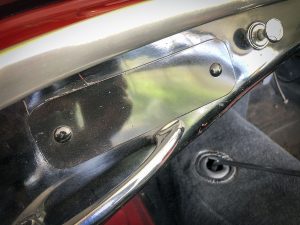
How would that happen? Let’s assume that this Right Hand Drive BN2, built 1 November 1955, was sold new in 1956 in England. The first owner wanted a radio and a cigar lighter (also in the picture), and so some dealer or shop was happy to oblige. Six years later the car was offered for sale at the Donald Healey Motor Company showroom in London. It was purchased by a US serviceman stationed in France, and he had the car transported to his home in Tacoma, Washington.
However, the radio in the car was not compatible for use in the USA where, in 1962, the AM band was about all you needed or wanted, and so they removed it, likely at the purchaser’s request – maybe even gave him a small credit for it – and fashioned this one-off blanking plate while they were at it. Once the car was in the USA, that new owner never bothered to get a radio installed, and the simple, crude blanking plate remained on the car all these decades later, and is still there today.
Educated guesswork? Yes. But that’s my theory and I believe it’s the most likely scenario for this one-off radio blanking plate in a RHD Healey that moved to Washington state 58 years ago.
If only these old cars could talk, but sometimes, if you listen closely enough, you really can “hear” them tell a tale.
Posted in Uncategorized
Leave a comment
“POINTY FUSES”
I have a history with pointy fuses, but we’re going to skip that and go right to noting that way back when, Lucas fuses had pointed ends such as those shown here.
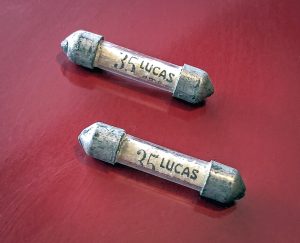
These were in the RHD BN2 that Kent Lambert and I recently acquired from the estate of the long-term (57 years) owner, and it’s a good bet they they are the car’s original fuses. Never mind that they are both 35 amp fuses instead of one 35 amp and one 50 amp. Sometimes “these things happen.”
If these don’t excite or at least amuse you, you may not be cut out for the concours game, because for concours-correctness you’re going to need pointy fuses. Or maybe you’d rather go lie down for awhile and see if the urge passes.
Posted in Uncategorized
Leave a comment
VINTAGE TIRES
I think we’re all well aware that old tires pose a safety risk, not to mention the reliability issue. Advice varies on when you should replace your tires, but it seems that most say that tires older than 7 or 8 years should be replaced.
That said, I’m always interested in the old tires often found as spares in these cars, and the latest acquisition, a 1956 BN2 with right hand drive and brought to the USA in 1962, is no exception. It’s part of the “automotive archeology” thing, piecing together the car’s history from the physical evidence.
This Avon brand “Turbospeed” tire probably dates from the late 1950s or so. The original spare would have been a Dunlop Roadspeed, so it’s not a stretch to infer that at some point those Dunlops were replaced by a set of Avons, and when the Avons were replaced, “the best one” (the least bad one) was assigned to spare tire duty. And there it remained until now.
Well done, faithful Avon. You performed long and well. We’ll bury you with appropriate honors.
Posted in Uncategorized
Leave a comment
YES, IT’S A THING – VINTAGE OIL!
I am reliably informed by John Turney, a retired chemical engineer, as follows:
“The limits on ZDTP (actually the phosphorous portion of ZDTP) started with API SG oils. The use of ZDTP started about 1935. So, it [my vintage oil] is perfect for Austin engines.
“The current 20W-50 VR-1 has sufficient ZDTP because of a sort-of loophole in the specifications. Oils with a viscosity of SAE 40 and above don’t have the low phosphorus limits because catalyst-equipped cars don’t use high-viscosity oils.”
So there we have it. Oils with an “API Service” rating earlier than SG, such as the SE and SF of my vintage oil (label on the back), don’t have the reduced phosphorus levels, so “it’s perfect for Austin engines.”
So now when some wise guy makes a crack about how the car may look all original, “But does it have original fluids?!?” I can respond with, “Funny you should ask…”
Posted in Uncategorized
Leave a comment
VINTAGE OIL … IS THAT A THING?
So I recently acquired two cases of some apparently vintage Valvoline oil.
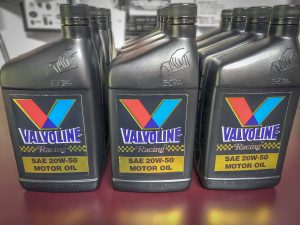
Labeled Valvoline Racing SAE 20W-50 Motor Oil, it looks like the same stuff that we know today as Valvoline VR-1 oil. And as you see, this stuff is in the familiar plastic bottles, so it’s apparently not real, real old.
There was a price tag on the box that may help to date it. It was labeled “Schuck,” presumably as in Shuck’s Auto Supply, and the price was $14.99. Yes, for the case. So maybe that helps date it: when was quality motor oil last selling for a buck twenty-five a quart? 1990? 1980? Earlier?
So here’s the deal, since these are new-condition bottles I’m going to assume that the oil is safe to use in a Healey’s motor, and I wonder if it is old enough that it already has all of the good stuff we want in oil for our vintage cars. You know, ZDDP. I’m thinking maybe this stuff is so old that it dates from before they started removing the chemicals we want for our old motors, and this is the right formula without needing any additives.
If you can confirm or correct that, your enlightenment is invited.
Posted in Uncategorized
Leave a comment
SAVE THE DATE, AUGUST 1
Right now things may look pretty bleak for the touring season, but there are a few signs of hope. One of those signs is a new event intended to become a regular annual fixture on the calendar in the Portland, Oregon area.

The name is a take-off on Portland’s venerable “All British Field Meet,” now in its 44th year. Meeting in a field is all well and good, but here’s an idea: Meet on a road, take a drive. Innovative, huh?
It’s a no-cost event with no registration, just an opportunity to drive your British car (or any car actually) in the company of other British car enthusiasts. The website isn’t ready to launch quite yet, but when it is I’ll do everything I can to let you know (kind of depends on you checking in here from time to time).
Meantime, save the date of Saturday, August 1, and get your British car running and ready to take part in a new annual event. On a road. Imagine that!
Posted in Uncategorized
Leave a comment

